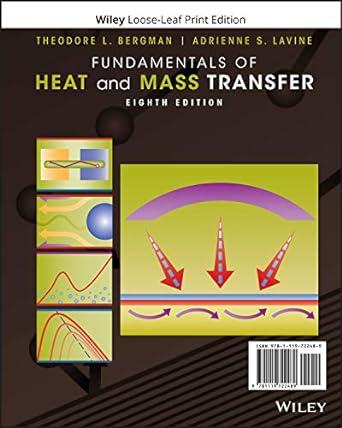Consider the conditions associated with the hot water pipe of Problem 7.42, but now account for the
Question:
Consider the conditions associated with the hot water pipe of Problem 7.42, but now account for the convection resistance associated with water flow at a mean velocity of \(u_{m}=0.4 \mathrm{~m} / \mathrm{s}\) in the pipe. What is the corresponding daily cost of heat loss per meter of the uninsulated pipe?
Data From Problem 7.42:-
Hot water at \(50^{\circ} \mathrm{C}\) is routed from one building in which it is generated to an adjoining building in which it is used for space heating. Transfer between the buildings occurs in a steel pipe \((k=60 \mathrm{~W} / \mathrm{m} \cdot \mathrm{K})\) of \(100-\mathrm{mm}\) outside diameter and 8-mm wall thickness. During the winter, representative environmental conditions involve air at \(T_{\infty}=-5^{\circ} \mathrm{C}\) and \(V=3 \mathrm{~m} / \mathrm{s}\) in cross flow over the pipe.
(a) If the cost of producing the hot water is \(\$ 0.10\) per \(\mathrm{kW} \cdot \mathrm{h}\), what is the representative daily cost of heat loss from an uninsulated pipe to the air per meter of pipe length? The convection resistance associated with water flow in the pipe may be neglected.
(b) Determine the savings associated with application of a 10-mm-thick coating of urethane insulation \((k=0.026 \mathrm{~W} / \mathrm{m} \cdot \mathrm{K})\) to the outer surface of the pipe.
Step by Step Answer:

Fundamentals Of Heat And Mass Transfer
ISBN: 9781119220442
8th Edition
Authors: Theodore L. Bergman, Adrienne S. Lavine





